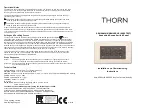
1-1
1
Track Configuration
When configuring Track, go to these sections for information you are interested in:
z
Track Overview
z
Track Configuration Task List
z
Configuring Collaboration Between the Track Module and the Detection Modules
z
Configuring Collaboration Between the Track Module and the Application Modules
z
Displaying and Maintaining Track Object(s)
z
Track Configuration Examples
Track Overview
Figure 1-1
Collaboration through the Track module
The Track module is used to implement collaboration between different modules.
The collaboration here involves three parts: the application modules, the Track module, and the
detection modules. These modules collaborate with one another through collaboration objects. That is,
the detection modules trigger the application modules to perform certain operations through the Track
module. More specifically, the detection modules probe the link status, network performance and so on,
and inform the application modules of the detection result through the Track module. After the
application modules are aware of the changes of network status, they deal with the changes
accordingly to avoid communication interruption and network performance degradation.
The Track module works between the application modules and the detection modules and is mainly
used to obscure the difference of various detection modules to provide a unified interface for application
modules.
Collaboration Between the Track Module and the Detection Modules
You can establish the collaboration between the Track module and the detection modules through
configuration. A detection module probes the link status and informs the Track module of the probe
result. The Track module then changes the status of the Track object accordingly:
z
If the probe succeeds, the status of the corresponding Track object is
Positive
;
z
If the probe fails, the status of the corresponding Track object is
Negative
.
At present, the detection modules that can collaborate with the Track module include the Network
Quality Analyzer (NQA) and the Bidirectional Forwarding Detection (BFD) module. Refer to
NQA
















































